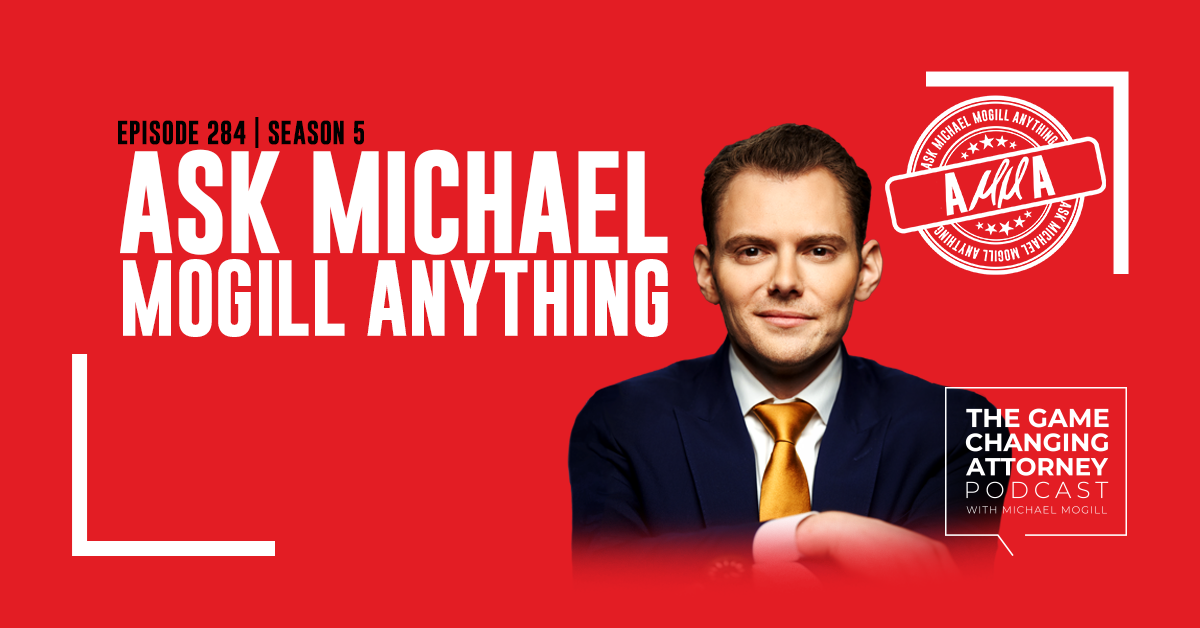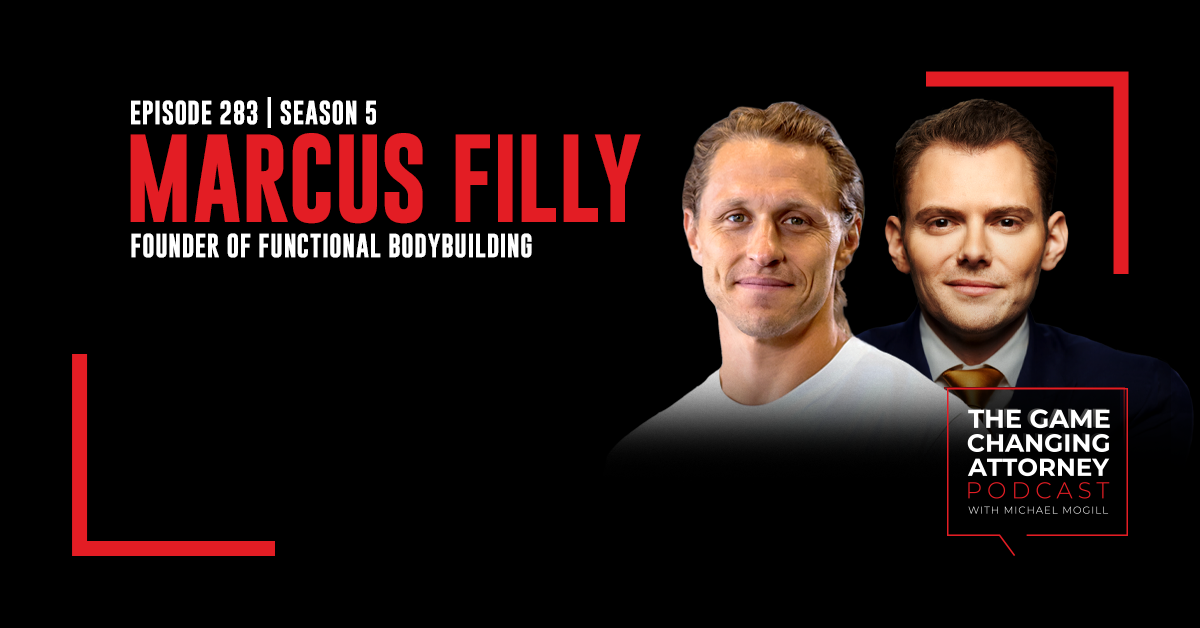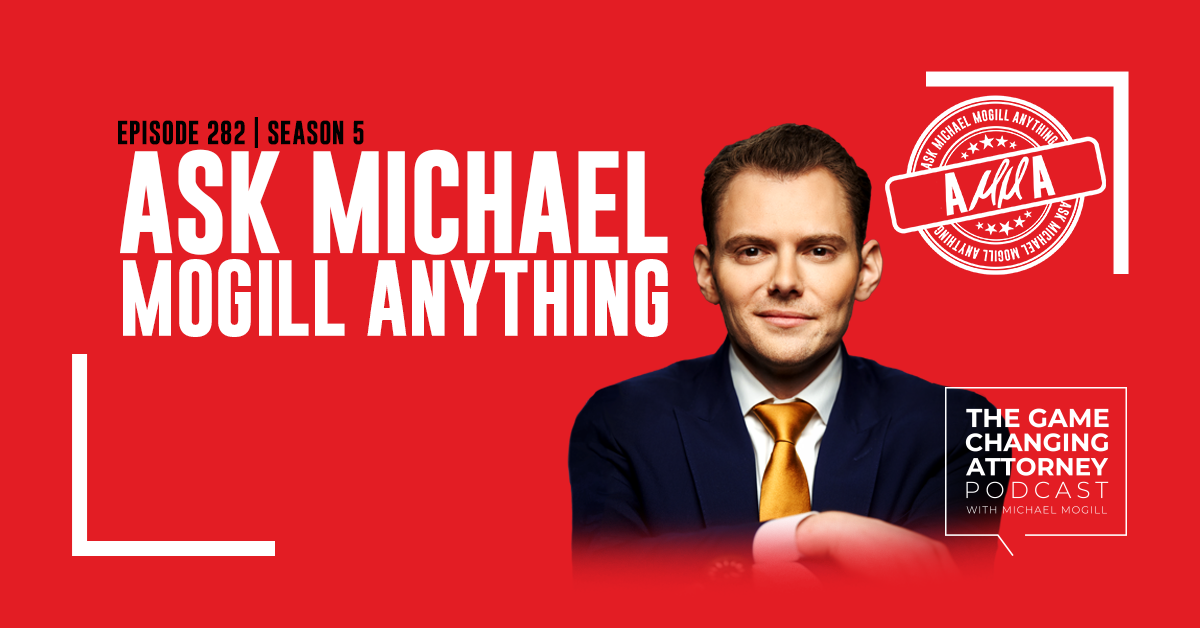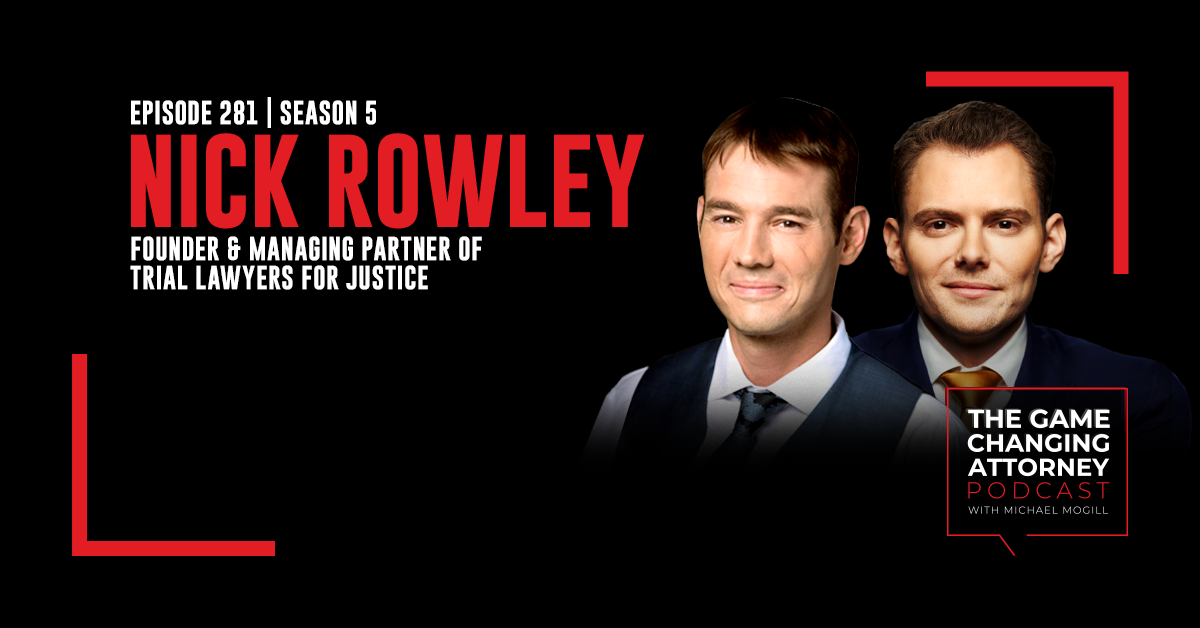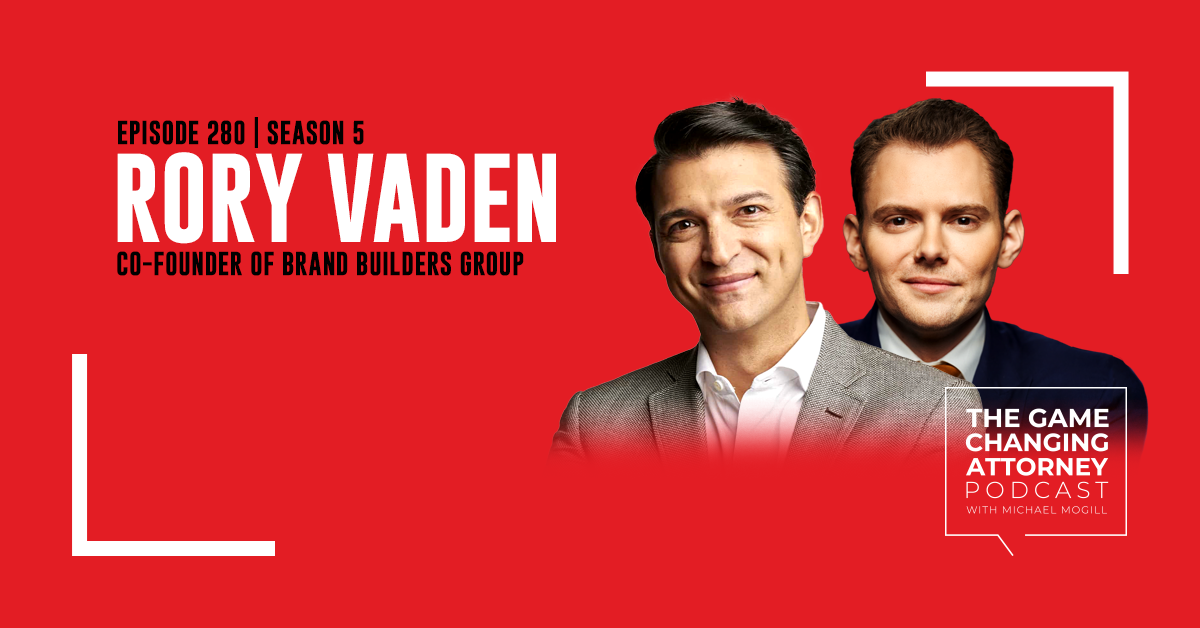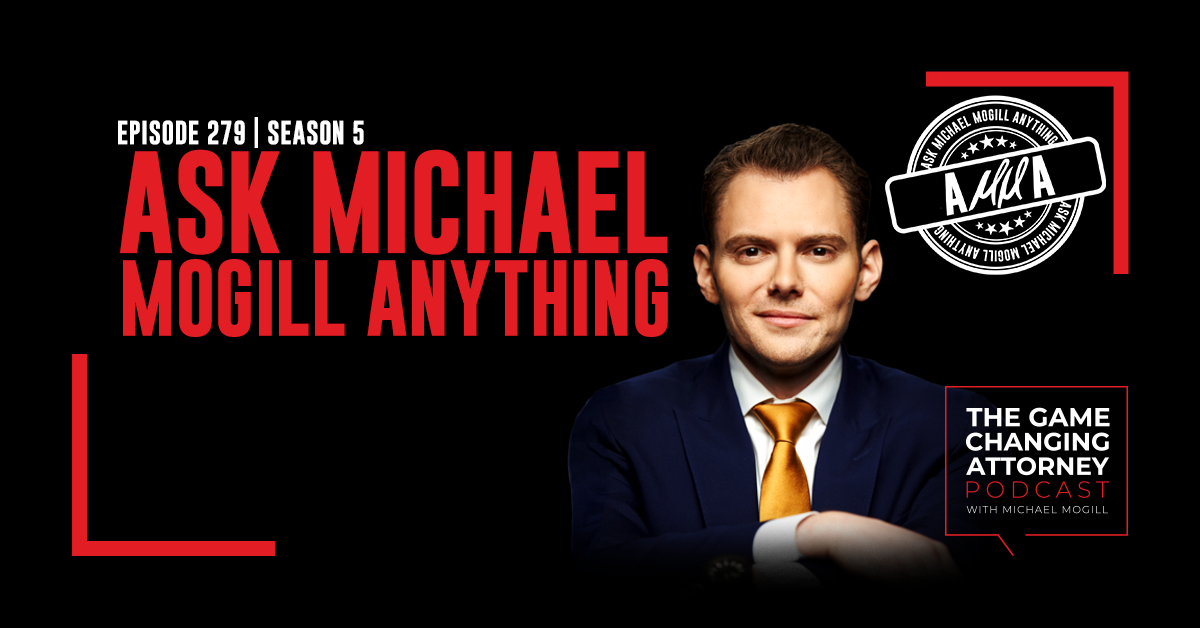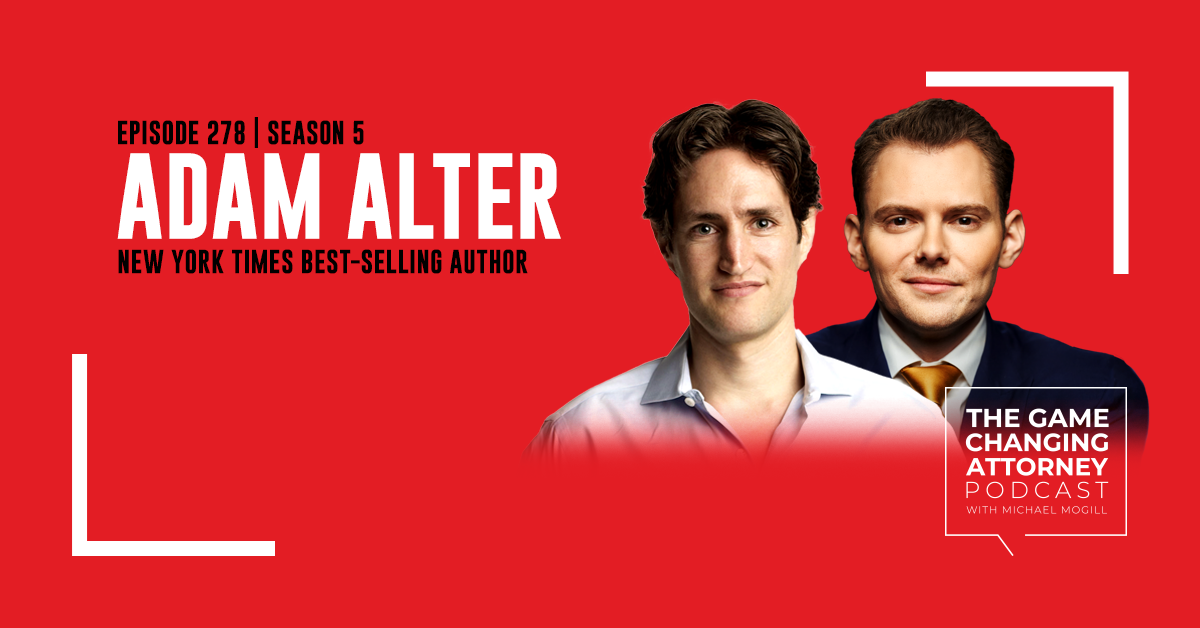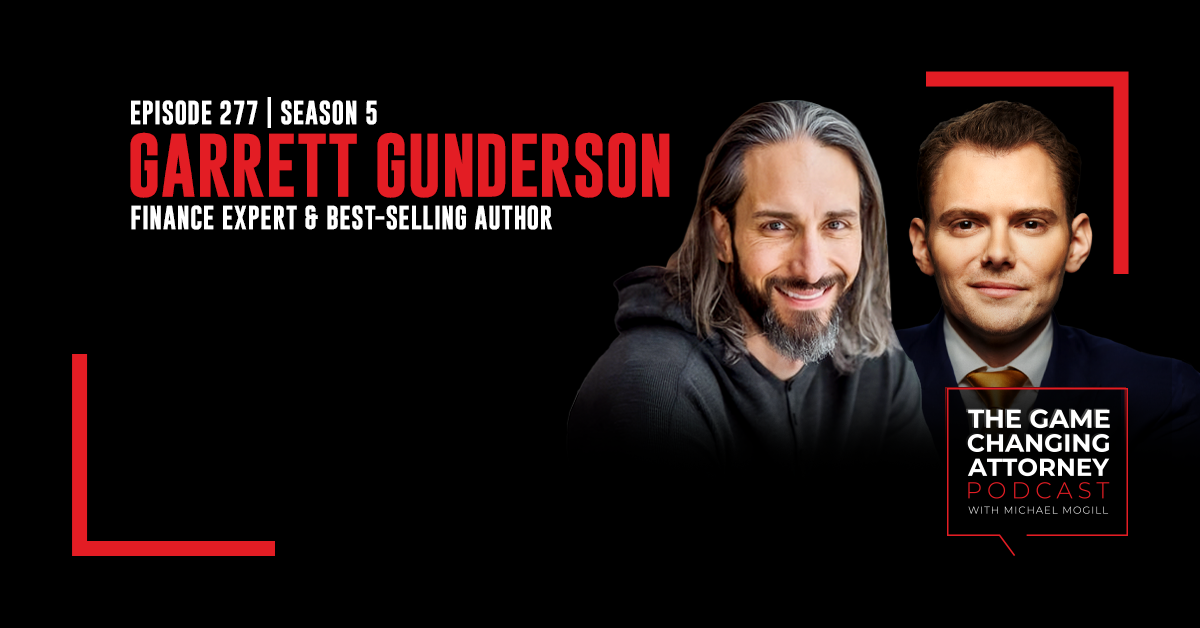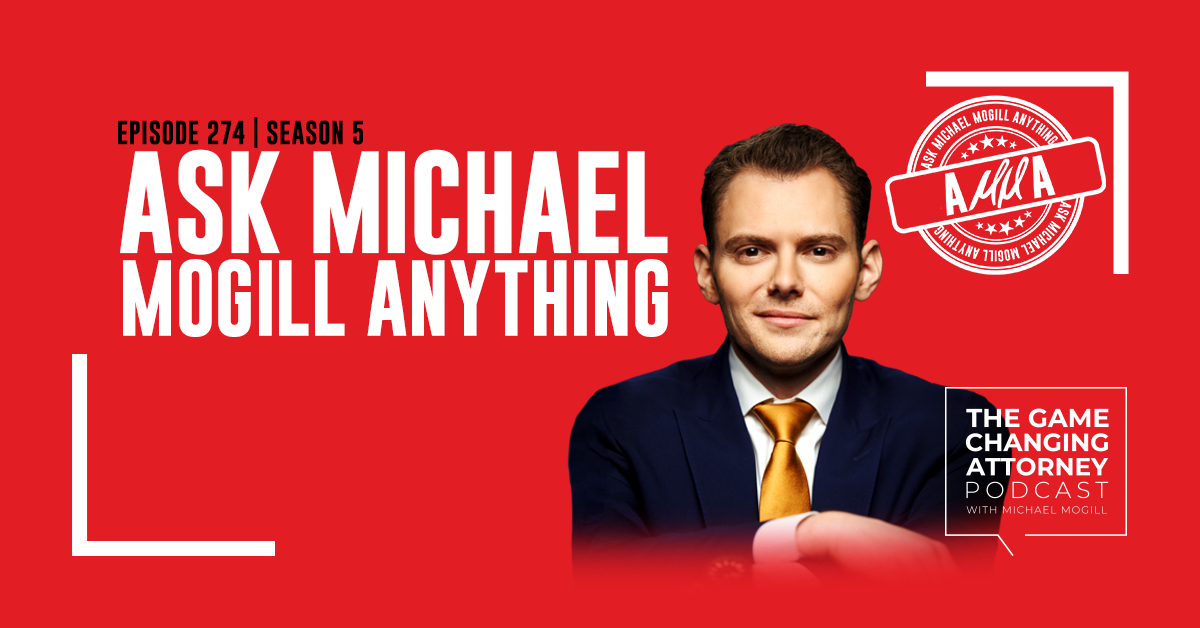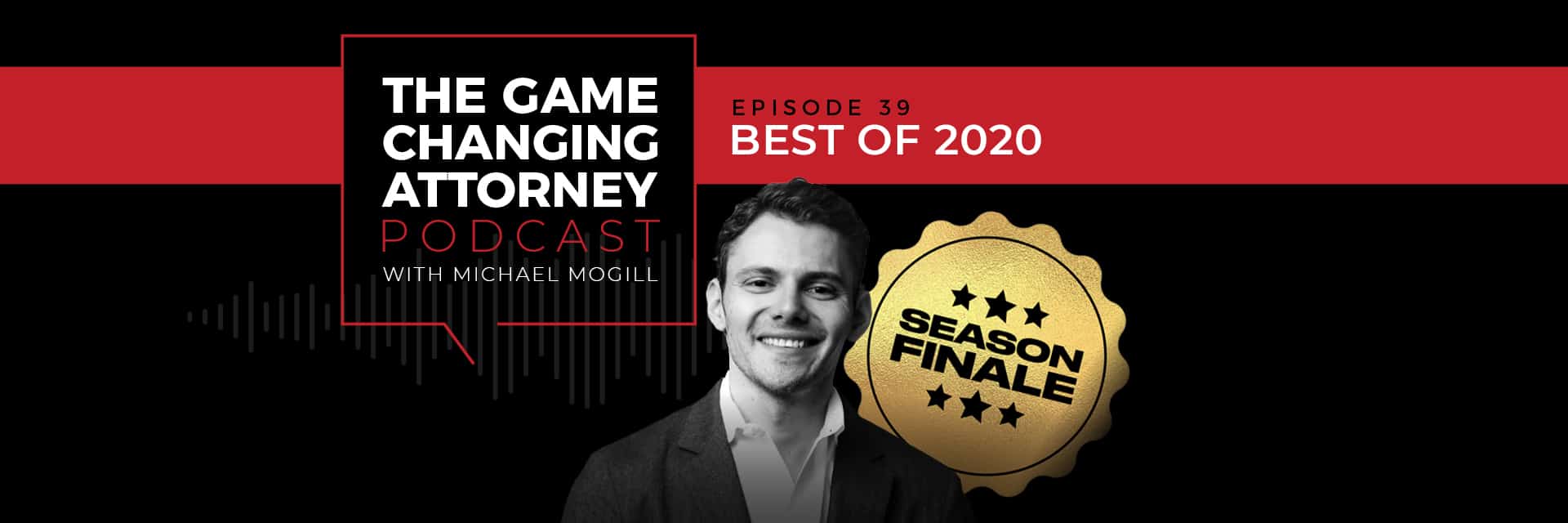
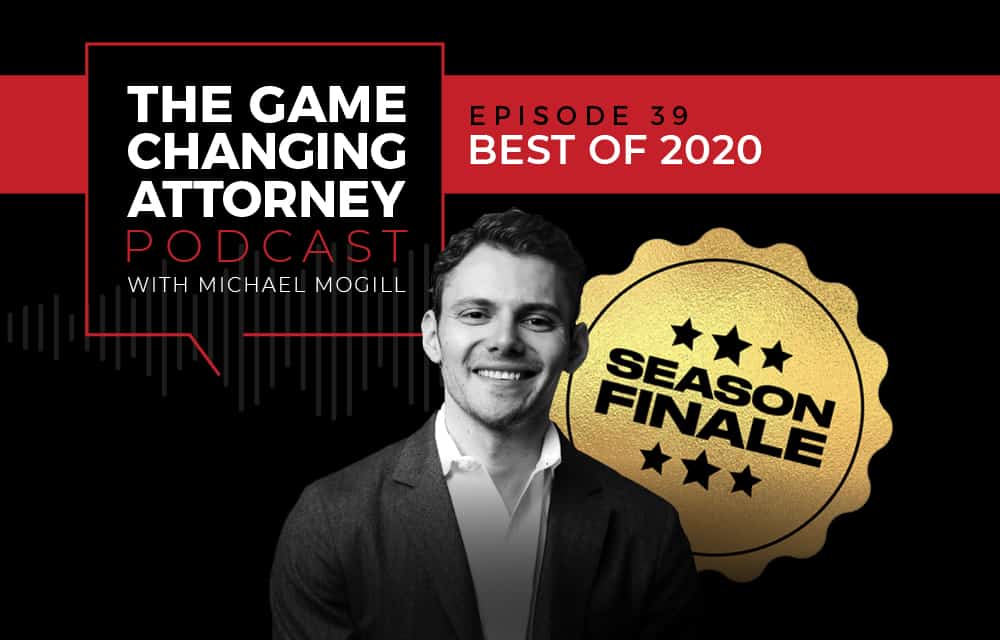
EPISODE 39 — Best of 2020
Game changing attorneys are a rare breed, but we’ve been fortunate enough to hear insights from a number of incredible law firm owners right here on this podcast. This year we’ve pulled back the curtain on these market leaders — from how they think to how they lead to the decisions that got them to where they are today. They’ve shared their incredible stories and actionable advice, and they’ve dropped more truth bombs (and occasional F-bombs) than we ever anticipated.
For the first-ever season finale of The Game Changing Attorney Podcast, we look back at the game changing conversations we had with some of the most iconic attorneys in the nation. Join us as we discover the mindsets that set these market leaders apart, the marketing strategies that took them to the next level, and everything in between.
Buckle up — it’s going to be a wild ride.
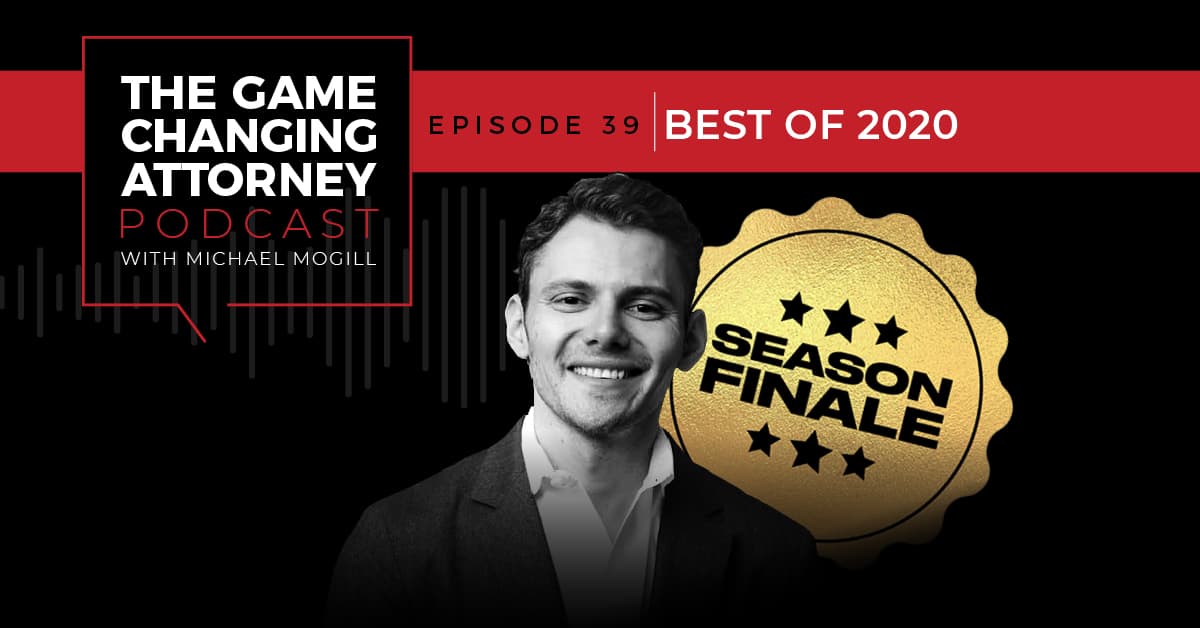
Listen & Subscribe
Show Notes:
2:37 – We’re animals in the jungle. “In the jungle today, a lion will be born. And that lion is the king of the jungle, just because he or she is a lion. The same day, a sloth will be born. Same day, same jungle, same deal. That sloth is so fucked, he can’t even describe it. All he can do is barely muster up enough energy to come down the tree, grab some berries, go to the bathroom, and go back up and go to sleep.” [John Morgan]
11:16 – Doing his part. “I see a society that in some ways has devalued life and devalued pain a lot. I refuse to accept that. That is a sense of fear of what we become as a world and as a society. I’m just trying to do my small piece on a case-by-case basis to remind folks — one-by-one and case-by-case — that every human being is valuable. Every human being’s experience is valuable.” [Joe Fried]
21:40 – How John Gomez stays at the top of his game. “I do this thing called Morning Routine. Every morning I get up at about 4:20 and I do transcendental meditation — I’m trained in that. Then, I pray and read the Bible for a little bit, and that kind of starts my day off right. I try to do something physical pretty much every day. I am a big fan of Jiu Jitsu, and I do Judo, which is very similar. I do Bikram hot yoga, which is to me very good for an older guy like me. If I do that during trial, I’ll go in and I’ll be doing the yoga, and then all of a sudden, just this thought will come to me that clarifies everything. So otherwise, I try to spend super quality time with my kids. I take them to their soccer practices or whatever practices, and I try to watch all their games. I’ve coached them all. I try to get quality time with the people around me. I try to get good sleep, eat well, and not ever go to a club or stay late at a bar, ever. So that’s basically where I’m at right now.” [John Gomez]
24:44 – On approaching adversity. “You know, I think I’ve always been a person of perseverance. I’ve faced difficult circumstances in my life. I’ve been without food. I’ve been dealing with bad people in my life. So having difficulties managing a law firm, in the larger sense, to me was always temporary. I always thought I could get through that, and I’ve always had confidence in my own ability to make things right. And I just said, ‘Look, I’m going to grind and grind. I’m going to make decisive action, and then I’m going to grind, and I know we’re good and we’re going to come out fine.’ It was a combination of perseverance based on past hardship with confidence in the future.” [John Gomez]
29:47 – What drives Alexander Shunnarah. “When I got to law school, I wanted my grades to be as good as anybody else’s.Then, when I got into personal injury space — and maybe this is funny — but I can’t imagine someone else being the most recognizable person or the number one law firm in Alabama. Not on my watch. I joke around that if I ever drive in Alabama and somebody has a larger law firm or is more popular than I am or is more branded, I’m just going to jump off a bridge. You know, that’s funny, but there’s no meaning for me anymore. It’s just who I am and it’s just what I do. The climb is fun, but staying on top is actually harder than the climb itself.” [Alexander Shunnarah]
35:25 – The mark of good branding. “Sometimes you wonder what your brand is, and then something you don’t even intend slaps you in the face. For example, this year, I’ve started to be in some of the live ads with Arthur, the theory being that we want to transition this very gradually. Well, you would have thought that a great unsolved crime had occurred during the first Cincinnati Reds game. People blew up our social media and our phone lines, wondering what happened to David. It got to the point where we actually had to put out on social media, ‘No, this is our transition. Dave is fine!’ We kind of had to prove Dave was okay. It became kind of a funny thing here, but it was such an incredible tribute to them. You wonder if people are paying attention, and here’s proof that they are.” [Jay Kelley]
38:35 – Recall and credibility. “Recall without credibility serves no purpose. Someone knowing our name but not having a level of trust or interest in our brand serves no purpose. They’re not going to call. You know, at the core of this is a legal relationship. It’s an attorney-client privilege, and that requires trust. So for people to contact our firm, they’re putting one of their biggest problems in their life in our hands, or at least considering us for that. So, I think recall is great. You have to have it. But what are they recalling? Are they recalling a phone number? No one needs a phone number anymore. I mean, Siri just dials it for you. What are they recalling, an address or your name? They need to actually have a positive association with your brand when they recall it, or it is pointless.” [Jay Kelley]
43:58 – Awareness is key. “I’m a criminal defense attorney. That’s what I do for a living, meaning I represent a lot of young black males in the criminal justice system. I say that because I’m very sensitized to those issues and to the biases that exist in the criminal justice system. So I had to be very aware of what the Martin family was going through, and not just the Martin family as those individuals, but the black community focused on the Zimmerman case as being the poster child case for that type of bias in the criminal justice system. The facts didn’t really match, but the passion was there in that community. And we had to be very aware and careful of that.” [Mark O’Mara]
49:45 – You’re either in or you’re out. “If you’re going to say that you’re a criminal defense lawyer, how dare you not take on the tough cases? What in God’s name you’re doing here? What you’re saying is, ‘Well, I’ll do the possession of cocaine cases because he had it in his pocket. I’ll do the DUI, or I’ll do this, but you know, those other ones, I don’t want to touch that.’ Well, then I don’t know, go sell cars.” [Mark O’Mara]
56:31 – If you’re comfortable with the status quo, you’ll never reach your full potential. “People get too comfortable, you know. They’re doing the same thing the same way. They handle these cop cases, they make a pretty good living — but what does it really do for your need to brand and your need to expand? How are you different than anyone else?” [Mike Papantonio]
1:02:28 – Glen Lerner’s mantra. “You know, my mantra involves two people on this planet: Nick Saban and Bill Belichick. Every time I speak, I talk about the two of them because I think they could be two of the greatest corporate CEOs of all time. They just run sports teams. But think about it, all they talk about is having a clearly defined process, getting people to buy into that vision, and then, ultimately, do your job.” [Glen Lerner]
1:08:12 – Creating a different work environment. “When you guys are here, I’m going to try to make this the best nine hours a day you spend — you know, eight hours plus your hour of lunch. I want this to be the best place because I know the way we treat our people — the respect we show them, the way we make them feel important — that affects them when they go home. It affects their personal life, with their husband, with their wife, with their children. I mean, I never wanted to be that boss that was yelling at people and denigrating people. I don’t think I’ve ever yelled at anybody in 29 years.” [Glen Lerner]
1:10:50 – It’s about what you do with the data. “So the fact that they had quantitative data is not that helpful — it’s whenever you have quantitative data, your ability to architect understanding and to structure data and information in a way that you can test that feedback loop. So you throw the information through it, you see if you’re right or not, and you can incrementally iterate, proving out this architecture. That’s what quantity is for, because once the data is out on the internet, whether it’s Facebook or Google or whatever — once you can digest the data, your understanding is exponential, because all the data lives on the internet. It’s not that hard to get. That’s kind of how I approach it. It’s about really architecting this fundamental understanding of how data works and how we can use the information we’re getting at a certain bandwidth in order to iterate that feedback loop, improve it, and then try some curated kind of stress test version of what data should look like in the industry. And then convince everybody else to use it, which is actually the easy part.” [Anthony Johnson]
1:18:34 – Brand marketing leads to profitability. “A lot of the direct-to-consumer marketing and digital marketing that is more leads-based maybe drives quantity — so it builds your audience — but it really just kind of pays the bills. So what I dug into finally after a while is realizing that most people that are very successful barely pay the bills with their direct-to-consumer marketing, but their brand marketing causes their second generation cases, causes their referral centers, causes evangelists of your tribe, of your brand and of your firm. And that is where they have exponential growth when it comes to profitability. So it’s definitely a two-part component, and if you want to have success and profitability, if you don’t have a brand, you kind of lose that entire thing.” [Anthony Johnson]
1:23:59 – The importance of knowing thyself. “I think the more we know and understand ourselves, the more honest we’ll be with ourselves. And I think it translates in front of a jury because juries — especially the younger jurors, but all jurors — seek authenticity. I mean, don’t we all seek that? I can be on your podcast, Michael, and I can give fake answers and people could sniff that out, and once they do, they discount everything else that I say. Or, I can try to be authentic to who I am — try to be genuine — and in the process, people may not agree with everything I say, but they’ll at least respect the fact that I’m trying to give them what I believe to be the truth.” [Mark Lanier]
1:28:30 – Having a David mindset in the courtroom. “I don’t get nervous; I get excited. You know, it’s really interesting, and this again is part of how I try a case from out of my faith. You know I’m in there because I think this is where God wants me to be — that clarity of purpose you were talking about before. I think this is what I’m supposed to do. You know, David wasn’t nervous when he was picking up the stones and he was about to fight Goliath, even though Goliath was a giant that frightened the rest of Israel.” [Mark Lanier]
EPISODE RESOURCES & REFERENCES
Academy of Truck Accident Attorneys (ATAA)
Brian Panish
Transcendental meditation
Jiu Jitsu
Judo
Bikram Hot Yoga
Bryant-Denny Stadium
Lamar Advertising
Joe Paterno
Cincinnati Reds
David Elk
Arthur Elk
Dr. Kirk Wakefield
NFL
MLB
COVID-19
Nirvana
George Zimmerman
Trayvon Martin
Don West
National Association of Criminal Defense Lawyers Magazine
Mass Torts Made Perfect (MTMP)
Zantac
Zoom
Danny Meyer
American Bar Association
Facebook
Google
Amazon
Tesla
Damascus Road
David and Goliath
Connect with Michael
- Text directly at 404-531-7691
